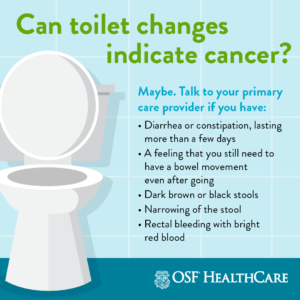
What does colon cancer in stool look like?
Our colons have the critical job of removing water, electrolytes and nutrients from our partially digested food. Anytime you notice a change in your bowel habits, you have something out of whack with your digestive system.
Our bowel movements are a good indicator of our overall health. Jomel Labayog, MD, hematologist and medical oncologist with OSF HealthCare, explains how bowel movements affect our bodies and can indicate colorectal cancer.
“There are many causes for changes in your bowel movements, including dehydration, poor diet and illnesses,” Dr. Labayog said. “Just because you experience a change doesn’t mean you have colorectal cancer.
“Colorectal cancer is slow growing and can have little to no symptoms. Pay attention to any changes and talk to your primary care provider.”
How the colon works
 As partially digested food travels through the colon, the final processing of the food is performed before being expelled from the body. Our colons remove the remaining water and extract final nutrients and electrolytes before passing the waste to the rectum for discharge.
As partially digested food travels through the colon, the final processing of the food is performed before being expelled from the body. Our colons remove the remaining water and extract final nutrients and electrolytes before passing the waste to the rectum for discharge.
“Our colons work much like a factory conveyor system.” Dr. Labayog said. “If the conveyor isn’t working efficiently for some reason, you will see a disturbance in output. A change in the way waste is formed and expelled.”
What does colon cancer stool look like?
Colon cancer poop is hard to define, but there are telltale signs. A tumor can cause a narrowing of the colon or rectum, inhibiting waste movement or blocking the absorption of nutrients and electrolytes. Dr. Labayog said this could lead to:
Inhibited movement of waste
- Constipation not relieved by over-the-counter medications lasting more than a few days or a bowel obstruction
- Pebble stool or pebble poop – Hard nuggets or lumps, resulting from excess moisture removal from the poop being stuck in the colon for too long – constipation
- Pencil-thin or narrow stool – Stool that has squeezed past the obstruction in the colon or rectum
- Never empty – Feeling like you still need to have a bowel movement even though you just did
- General discomfort – Ongoing gas pains, bloating, abdominal pain, fullness or cramps resulting from the waste being inhibited in the colon
A change in normal function
Curious about other symptoms?
- Diarrhea not relieved by over-the-counter medications lasting more than a few days, resulting from the colon’s inability to remove water from the waste fast enough
- Weakness and fatigue – Our bodies must have smooth waste processing and disposal. A disruption in the process taxes our bodies, leaving us exhausted
- Unintended weight loss – A result of the body not getting the nutrients it needs, excess waste backing up in our digestive system and stress placed on all organs to compensate
- Blood in the stool or bright red rectal bleeding – Pre-cancerous polyps and cancer tumors are fragile and bleed easily. As stool passes them, an amount of blood vessels can mix with the stool, causing dark brown or black stool
“Unfortunately, in most cases, colorectal cancers develop slowly over several years with little to no symptoms. Most begin as a polyp,” Dr. Labayog said. “The next thing you know, the cancer has spread.
“If you notice any change in your bowel movements or signs of constipation, you should talk to your primary care provider. You’ll feel better physically and mentally.”
Cancer screenings are the key to catching it in the early stages when cancer treatment is most effective.